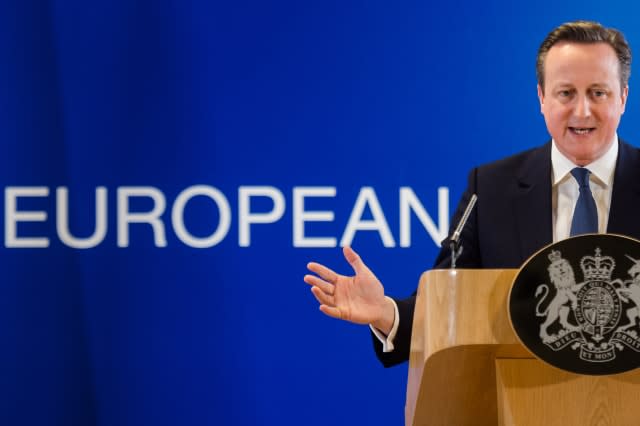A big deal from Dave - does it make any difference?

So that's it.
David Cameron has come back from Brussels. He's got his deal.
The referendum will be held on 23 June, ahead of a summer news cycle that will – with depressing inevitability – focus on the horrors of Syria and the refugee disaster.
Sides have been chosen. Boris Johnson – probably Cameron's biggest concern – has opted to go with Brexit.
Now the campaigning starts in earnest...
Dave's big deal
So what does this deal involve? There are four main points to note.
Firstly, there's the "emergency brake" on giving in-work benefits to new EU immigrants. This would allow any EU country to limit access to such benefits for up to four years (though they would still build up over the course of the four years). There are also reductions in child benefit being sent abroad.
Secondly, Britain can appeal to other countries if it feels it is being discriminated against for not being part of the euro. This is basically about trying to protect the City from disadvantageous new rules.
Thirdly, there's the "red card". This would allow 16 or more national parliaments to object to new EU laws. But that's different to blocking them. If the European Council decides to go ahead, it can. As Full Fact points out, "how effective these mechanisms are in practice will depend on how seriously they're taken".
Fourth, the treaties are to be amended to state explicitly that the goal of "ever-closer union" does not apply to the UK.
In short, this isn't a spectacular change to our relationship with the EU, and I don't think anyone expected it to be. It's also worth bearing in mind that there are several elements that still need to pass through the legal system, and it's possible – particularly on the benefits front – that there could be challenges along the way.
More to the point, it's not going to change anyone's mind. If you were pro-Brexit on Thursday, you'll still be today. If you were against leaving on Thursday, you'll still feel the same now.
The real reason to vote for Brexit
At the end of the day, the argument for leaving the EU is not about benefits for immigrants or Britain securing paper promises that it won't be forced to do anything it doesn't want to do.
Even the somewhat europhile FT admits that this is "a statement of limited legal value, but of symbolic importance". Sorry, but symbolism doesn't cut it when the lawyers get their teeth into you.
You only need to look at how other countries have reacted to the deal to see that not everyone is on board with Britain's view of the EU. Depending on which papers you read, we're getting special treatment, we've reformed the entire continent for our own ends, or it's no big deal.
The FT has a good summary. In the Italian press, former prime minister (and ex-president of the European Commission) Romano Prodi bemoaned the fact that "Brussels has officially enshrined a multi-speed Europe".
Spain's El Pais reckons the EU has "paid a high and unjustifiable price to secure the continued membership of a wayward partner".
Germany and the more eurosceptic papers were less concerned. But that's at least partly because their own papers and populations are pretty eurosceptic as it is.
Leaving the EU is first and foremost about accountability. It's all about being able to vote for the people who have an impact on your life. Our own politicians might consistently make mistakes and get on our nerves, but at least we can get rid of them. We're much further away from the levers of power in the EU, and I think that needs to change.
I also worry that a "yes" vote will be taken as a "go-ahead" for further integration. Obviously, most of the concessions that Dave has won are aimed at making that seem less likely, but as we've already noted, they don't have legal teeth.
Given this fundamental, long-term concern, I'm happy to pay any short-term price involved in leaving the EU – I'm not convinced it'll be that significant economically in any case. But we'll be looking at all of those issues in a lot more detail in the next issue of MoneyWeek magazine.
We're interested in your views too. I've already received plenty of interesting feedback from readers on this topic and I expect to receive a lot more. Send us your comments to editor@moneyweek.com.




